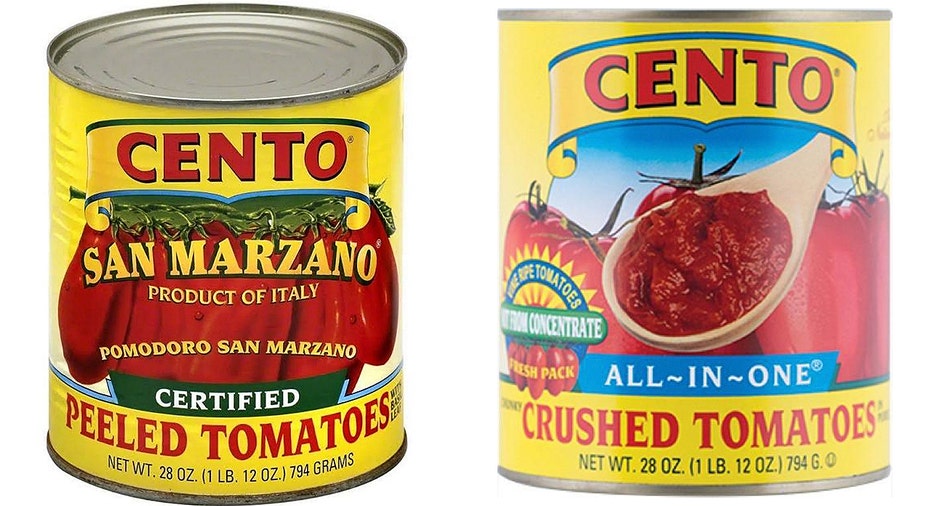Cento Fine Foods sued by customers claiming San Marzano tomatoes are not authentic: reports

A lawsuit claimed Cento's San Marzano tomatoes were not authentic. (Cento Fine Foods)
Cento Fine Foods was left stewing last week after three California consumers filed a lawsuit claiming the New Jersey-based company was selling cans of San Marzano tomatoes that weren’t really the famed fruit, reports said.
The class-action lawsuit, filed in San Francisco, stated that Cento was falsely marketing their San Marzano tomatoes as “authentic” and grown in Agro Sarnese Nocerino, an area in Southern Italy with “rich volcanic soil,” the Cherry Hill Courier-Post reported. The plum tomatoes, grown at the base of Mount Vesuvius, are a favorite among tomato lovers because of their sweet flavor and low acidity, according to the kitchn.
Cento’s products contain tomatoes from the adjacent region where San Marzano tomatoes are grown in Campania, Italy, according to the lawsuit. Consumers also claimed the company’s product lacked the consortium — Consorzio di Tutela del Pomodoro San Marzano DOP — that certifies products as genuine San Marzano tomatoes. Instead, the Cento products are certified by a third-party organization, the suit stated, according to the Courier-Post.
The lawsuit alleged shoppers were being deceived and taken advantage of because they were purchasing Cento’s cans of San Marzano tomatoes "instead of other tomatoes, because, rightly or wrongly, consumers believe San Marzano tomatoes have a superior look and taste.” It acknowledged that Cento “may sell some 'San Marzano' tomatoes that are grown in the Agro Sarnese Nocerino,” but the company does not disclose its lack of DOP certification.
A 28-ounce can of Cento’s San Marzano peeled tomatoes costs $3.69 at Target, versus a 28-ounce of Red Pack’s canned whole peeled tomatoes at $1.69.
The lawsuit seeks damages for Cento consumers in California and throughout the U.S.
Melissa Weiner, the attorney for those who filed the suit, told KGO-TV that the lawsuit seeks to reimburse shoppers who’ve been duped by Cento.
“[The lawsuit] seeks to reimburse consumers for the price they paid for tomatoes that are, as alleged, not certified or true San Marzano tomatoes and halt Cento's allegedly deceptive marketing and labeling of the tomatoes,” she said in a statement.
Cento issued a statement on its website insisting it was selling San Marzano tomatoes and explained why the cans did not bear the DOP seals.
“Cento Certified San Marzano Tomatoes have been, and continue to be grown and produced, in the Sarnese Nocerino area of Italy. They continue to follow the same high-quality standards that Cento has always stood by,” read the statement under the page “The Truth About San Marzano Tomatoes.”
“After our new crop was approved and certified authentic in 2010, a new organization was appointed in Italy to govern our labels. After months of delay in their response, we were notified that our label no longer conformed to their requirements,” the statement continued. “Due to the unreasonable nature of the new label requirements, Cento decided to remove the DOP seals from our label: however, they remain certified San Marzano tomatoes and continue to follow the high-quality standards.”
CLICK HERE TO GET THE FOX BUSINESS APP
The company said the tomatoes are certified by a third-party organization, Agri-Cert, to make sure it followed harvesting, growing and processing procedures while handling San Marzano tomatoes.
“We assure you, in no way has this product’s certifications and quality standards changed,” the company wrote.
Cento also said in a separate statement to KGO-TV that the lawsuit was brought forward with “a mere allegation.”
“Cento is the only brand to have full traceability, sustainability, and transparency of San Marzano tomato products. With groundbreaking Find My Field and PAC Traceability, consumers are able to pinpoint the exact field in which the tomatoes in each can of Cento Certified San Marzano Tomatoes are grown,” part of the statement read. “…Cento firmly refutes all of the ignorant, inaccurate, and wrongful claims in the complaint and is astounded by the lack of factual information therein.”




















